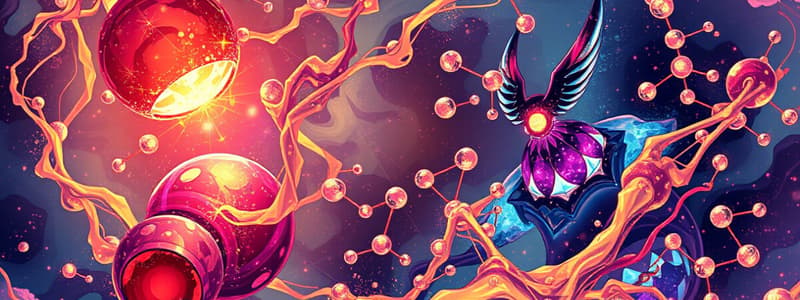Podcast
Questions and Answers
What distinguishes molecular compounds from ionic compounds in terms of bonding and composition?
What distinguishes molecular compounds from ionic compounds in terms of bonding and composition?
Molecular compounds are formed by covalent bonds between nonmetals, while ionic compounds are formed from the electrostatic attraction between oppositely charged ions.
Explain the conductivity of ionic compounds compared to molecular compounds.
Explain the conductivity of ionic compounds compared to molecular compounds.
Ionic compounds conduct electricity when dissolved in water or molten due to mobile ions, while molecular compounds are typically poor conductors as they lack free-moving ions.
How do the physical properties, such as melting and boiling points, typically compare between ionic and molecular compounds?
How do the physical properties, such as melting and boiling points, typically compare between ionic and molecular compounds?
Ionic compounds generally have higher melting and boiling points than molecular compounds due to the strong electrostatic forces between ions.
Describe the structure and bonding characteristics of metallic compounds.
Describe the structure and bonding characteristics of metallic compounds.
What are coordination compounds, and how do they typically differ from complex compounds?
What are coordination compounds, and how do they typically differ from complex compounds?
Discuss the general reactivity of molecular compounds compared to ionic compounds.
Discuss the general reactivity of molecular compounds compared to ionic compounds.
How does solubility in water typically differ between ionic and nonpolar compounds?
How does solubility in water typically differ between ionic and nonpolar compounds?
What role do functional groups play in determining the odor and taste of molecular compounds?
What role do functional groups play in determining the odor and taste of molecular compounds?
Flashcards are hidden until you start studying
Study Notes
Types of Compounds
-
Molecular Compounds
- Composed of molecules.
- Formed by covalent bonds between nonmetals.
- Example: Water (H₂O), Carbon Dioxide (CO₂).
-
Ionic Compounds
- Formed from the electrostatic attraction between oppositely charged ions.
- Typically consist of metals and nonmetals.
- High melting and boiling points.
- Example: Sodium Chloride (NaCl).
-
Metallic Compounds
- Composed of metal atoms bonded by metallic bonds.
- Characterized by a sea of delocalized electrons.
- Exhibit conductivity and malleability.
- Example: Iron (Fe), Copper (Cu).
-
Coordination Compounds
- Contain a central metal atom or ion bonded to surrounding molecules or ions (ligands).
- Often involve transition metals.
- Example: Hemoglobin, [Fe(CN)₆]⁴⁻.
-
Complex Compounds
- Similar to coordination compounds but may have more complex structures.
- Involve various ligands and geometry.
- Example: [Cu(NH₃)₄]²⁺.
Compound Properties
-
Physical Properties
- State: Can be solid, liquid, or gas at room temperature.
- Melting/Boiling Points: Varies widely; ionic compounds tend to have higher points than molecular compounds.
- Solubility: Depends on polarity; ionic compounds are usually soluble in water, while nonpolar compounds are not.
-
Chemical Properties
- Reactivity: Varies based on compound type; ionic compounds often react with acids/bases, while molecular compounds can undergo various reactions depending on their functional groups.
- Stability: Ionic compounds are generally stable in solid form but may dissociate in solution. Molecular compounds can be unstable depending on their structure and bond types.
-
Conductivity
- Ionic Compounds: Conduct electricity when dissolved in water or when molten due to the mobility of ions.
- Molecular Compounds: Typically poor conductors in all states as they do not contain free-moving ions.
-
Hardness and Brittleness
- Ionic Compounds: Generally hard but brittle; can shatter when force is applied.
- Metallic Compounds: Malleable and ductile, allowing them to be shaped without breaking.
-
Odor and Taste
- Many molecular compounds have distinct odors and tastes, influenced by their molecular structure and functional groups.
Types of Compounds
- Molecular Compounds: Formed by covalent bonds between nonmetals, resulting in discrete molecules. Common examples include Water (H₂O) and Carbon Dioxide (CO₂).
- Ionic Compounds: Created through electrostatic attractions between positively and negatively charged ions. Typically consist of metals paired with nonmetals and exhibit high melting and boiling points, exemplified by Sodium Chloride (NaCl).
- Metallic Compounds: Comprised of metal atoms linked by metallic bonds, characterized by a "sea" of delocalized electrons. Notable for their conductivity and malleability, with examples such as Iron (Fe) and Copper (Cu).
- Coordination Compounds: Feature a central metal atom or ion bonded to surrounding ligands, often involving transition metals. Hemoglobin and the complex ion [Fe(CN)₆]⁴⁻ are representative examples.
- Complex Compounds: Related to coordination compounds but with more intricate structures that can involve multiple ligands and varying geometries, such as [Cu(NH₃)₄]²⁺.
Compound Properties
-
Physical Properties:
- State: Compounds can exist as solids, liquids, or gases at room temperature.
- Melting/Boiling Points: Ionic compounds generally exhibit higher melting and boiling points than molecular compounds.
- Solubility: Influenced by polarity; ionic compounds are usually water-soluble, while nonpolar compounds often are not.
-
Chemical Properties:
- Reactivity: Reactivity varies by compound type; ionic compounds commonly react with acids and bases, while molecular compounds undergo reactions based on functional groups.
- Stability: Ionic compounds are stable in solid form but may dissociate in solutions. In contrast, molecular compounds' stability depends on their structural characteristics and bonding.
-
Conductivity:
- Ionic Compounds: Conduct electricity when dissolved in water or melted due to ionic mobility.
- Molecular Compounds: Generally poor electrical conductors in all forms, lacking free-moving ions.
-
Hardness and Brittleness:
- Ionic Compounds: Generally hard yet brittle, they may shatter under force.
- Metallic Compounds: Known for malleability and ductility, allowing for shaping without breaking.
-
Odor and Taste: Many molecular compounds are characterized by distinctive odors and tastes, which are influenced by their molecular structures and functional groups.
Studying That Suits You
Use AI to generate personalized quizzes and flashcards to suit your learning preferences.




